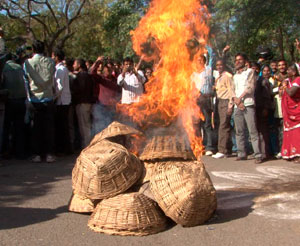 STORIES OF CHANGE
STORIES OF CHANGEDECODING THE ACT AGAINST MANUAL SCAVENGING
The Prohibition of Employment as Manual Scavengers and their Rehabilitation Act, 2013 easily explained

Manual scavenging has always been linked to the practice of untouchability, but Article 17 of the Constitution of India abolishes the continuation of such practices. The Act forbidding the employment of manual scavengers and construction of dry toilets has existed since 1993 but it has seen little or no implementation and furthermore, not a single conviction. For a more comprehensive approach towards the issue and a stricter execution of the act, a new bill was drafted in 2012.
After the airing of the episode on untouchability on July 8, 2012, Aamir met Prime Minister Manmohan Singh and Union Social Welfare Minister Mukul Wasnik to highlight the concerns of manual scavengers. The bill was eventually passed by both Houses of Parliament on September 7, 2013, as The Prohibition of Employment as Manual Scavengers and their Rehabilitation Act, 2013.
Salient features of the act
The definition of ‘manual scavenger’ has been widened to include a person engaged or employed for manual cleaning of human excreta in an insanitary latrine, an open drain or pit, on railway tracks, etc.
Prohibitions
- Manual scavenging, other than manual cleaning of sewers and septic tanks without protective equipment
- The construction of insanitary latrines
- Any contract for employment of manual scavengers shall stand nullified on the date of commencement
- The employer cannot terminate the employee from the job for budgetary reasons. Instead, the employee will be given work other than manual scavenging for at least the same remuneration
- No person, local authority or any agency shall engage or employ, either directly or indirectly, any person for hazardous cleaning of a sewer or a septic tank
Penalty
- For employing manual scavengers or failing to demolish insanitary latrines: imprisonment of one year or a fine of Rs 50,000, or both, for the first violation. For subsequent violations by the same person, the punishment shall stand at imprisonment for two years, or a fine of Rs 1 lakh, or both
- For hazardous cleaning of septic tanks and sewers: imprisonment of two years and/or a fine of Rs 2 lakh for the first violation. For subsequent violations by the same person, the punishment shall stand enhanced to imprisonment for five years, or fine of Rs 5 lakh, or both
Implementation
- Each occupier of an insanitary latrine is responsible for converting or demolishing it at his own cost
- If he/she fails to do so, the local authority will convert the latrine and recover the cost from him/her
- Each local authority, cantonment board and railway authority is responsible for surveying insanitary latrines within their jurisdiction, and providing sanitary community latrines within such period not exceeding three years from the date of commencement of the Act
- It is the duty of every local authority to use modern technology to clean sewers, septic tanks and other spaces within their control
- Vigilance and monitoring committees to be set up at the sub-division and district levels
- Monitoring committee to be set up at the state and central levels
- The Act has definite provisions for identification of manual scavengers and insanitary latrines
- The municipality of a locality or the panchayat of a village will conduct a survey to identify existing manual scavengers and insanitary latrines
- The municipality (in urban areas) and panchayats (in rural areas) will also be responsible for the rehabilitation of those identified as manual scavengers
- The appropriate government may also appoint certain persons as inspectors and such inspectors shall have the power to enter any premises within his/her jurisdiction for the purpose of determining whether any person has been employed as a manual scavenger at such place
Rehabilitation
- Manual scavengers who are identified in urban areas receive a photo identity card giving information about dependent family members
- An initial, one-time cash assistance shall be provided
- Manual scavengers are to be allotted a residential plot and financial assistance for construction, or a ready-built house and scholarship for children as per the relevant scheme of the central or state government or the local authorities as the case may be
- They shall be trained in a livelihood skill, subject to eligibility, and provided a monthly stipend of Rs 3,000 during the training
- They shall be provided with subsidy and concessional loan if they want to take up an alternative profession, subject to eligibility
- Legal and programmatic assistance will also be provided as notified by the central or state government
- Manual scavengers in rural areas will be rehabilitated by as per the previous provision relating to urban manual scavengers
No comments:
Post a Comment